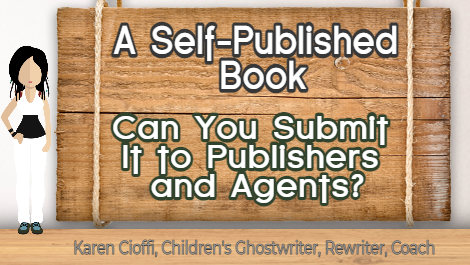The rise of self-publishing has opened doors for countless authors, allowing them to bypass traditional gatekeepers and bring their stories directly to readers. Yet many self-published authors still aspire to secure a traditional publishing deal, seeking wider distribution, professional editing, and marketing support.
A common question arises: Can an author submit a self-published book to a publisher or literary agent?
The Short Answer: Yes, But With Conditions
In general, authors can submit a self-published book to literary agents and traditional publishers. However, doing so successfully depends on several factors, including the book’s sales record, quality, and how it’s presented during the submission process.
WHY PUBLISHERS MIGHT CONSIDER A SELF-PUBLISHED BOOK?
Traditional publishers are increasingly open to acquiring self-published titles—especially those that have demonstrated commercial viability or have built a strong reader following.
For instance, bestselling books like The Martian by Andy Weir and Still Alice by Lisa Genova began as self-published works before being picked up by major publishers.
Here’s what makes a self-published book attractive to a publisher:
- Strong Sales: A proven track record (usually 5,000+ copies sold) can show that a book has market potential.
- Niche Success: Even modest sales in a niche market can interest a publisher looking to expand into specific genres or demographics.
- High-Quality Writing: A compelling, well-edited book can speak for itself regardless of origin.
- Platform & Audience: If the author has an active social media presence, email list, or speaking engagements, this signals built-in marketing support.
SUBMITTING A SELF-PUBLISHED BOOK TO A LITERARY AGENT
Many agents are open to representing a self-published book—especially if the author is also working on future unpublished projects.
When querying an agent with a self-published title, it’s essential to:
-Mention that the book was self-published.
-Provide sales figures, rankings, and reader reviews if they’re strong.
-Include the format and retail price of the books sold. This information will matter to the agency.
-Include marketing efforts (blog tours, ads, newsletters, social media).
-Clarify whether you are submitting just that book or seeking representation for future works.
Agents may be more interested in representing you as an author than acquiring rights to an already published book unless the book has shown impressive commercial success.
So, now, the question arises: Do you submit the book itself or submit it from scratch?
While there is no right or wrong way to submit a self-published book, agent Steve Laube notes, “In my opinion, it is best to start over with a full proposal and sample chapters. In other words, act as if the self-published work doesn’t exist.”
https://stevelaube.com/what-is-the-best-way-to-submit-my-self-published-book/
Laube goes on to say that you must include the fact that the book is self-published and the number of sales.
Honesty is a must.
SUBMITTING TO A TRADITIONAL PUBLISHER
Submitting directly to a traditional publisher (especially without an agent) is more challenging but not impossible. Some publishers, especially independent or hybrid presses, accept direct submissions from authors.
In these cases:
-Be transparent about the book’s publication history.
-Make sure the book has been thoroughly edited and formatted.
-Offer evidence of the book’s reception—sales data, reviews, awards, etc.
Keep in mind that large traditional publishers (like the “Big Five”) almost always require submissions to come through an agent.
RIGHTS REVERSION AND REPUBLISHING
If a publisher is interested in acquiring a previously self-published book, they will probably want to “relaunch” it under their imprint.
The relaunching process will usually involve:
-Unpublishing the book—taking the current version off the market.
-Making revisions or new edits.
-Designing new covers and marketing materials.
This process allows the publisher to rebrand and distribute the book as if it were new. Authors need to ensure they hold full rights to the self-published version and aren’t locked into restrictive agreements with distributors or platforms like Amazon KDP.
TIPS FOR SUCCESS
- Be Honest: Never try to hide the fact that the book was self-published. Transparency builds trust.
- Treat It Like a New Submission: A strong query letter and synopsis are just as important as they are for unpublished manuscripts.
- Highlight What Makes Your Book Unique: If your book fills a gap in the market, has amazing sales, or tackles a trending topic, emphasize this.
- Invest in Quality: Poor editing, formatting, or cover design will most likely deter agents and publishers, regardless of content.
SUMMING IT UP
While the road from self-publishing to traditional publishing can be competitive and restrictive, it’s not a dead end. Many successful authors have taken this route, proving that a self-published book can jump the chasm and be a steppingstone rather than a detour or a pitstop.
By understanding the industry’s expectations and presenting your work professionally, you can increase your chances of catching a literary agent’s or publisher’s eye.
Keep in mind that persistence, professionalism, and a willingness to learn from feedback are key qualities when submitting work.
Reference:
What is the best way to submit my self-published book

Unpublishing a Book on Amazon?
Editing a Children’s Book – 10 Tips Checklist for Authors
Submitting Your Manuscript – 8 Tips

I’m a working children’s ghostwriter, rewriter, and coach. I can help turn your story into a book you’ll be proud to be the author of, one that’s publishable and marketable.
OTHER HELP I OFFER:
HOW TO WRITE A CHILDREN'S FICTION BOOK
A DIY book to help you write your own children’s book.
FICTION WRITING FOR CHILDREN eCOURSE
4-Weeks / 8 Sections Guided Self-Study Mentoring Program
You can contact me at kcioffiventrice@gmail.com.


1 thought on “Can You Submit Your Self-Published Book?”